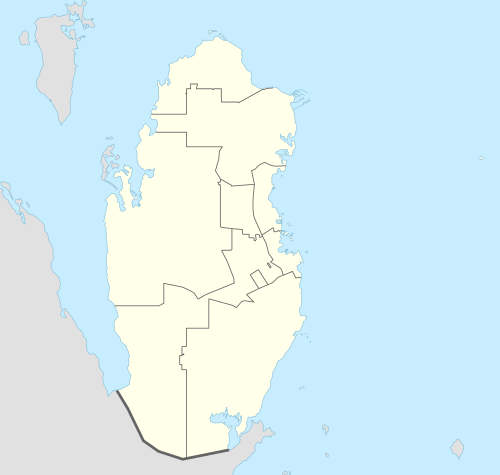Ras Abrouq
| Ras Abrouq | |
|---|---|
 Ras Abrouq Location in Qatar | |
| Coordinates: 25°31′22″N 50°49′41″E / 25.52278°N 50.82806°E | |
| Country | Qatar |
| Municipality | Al Rayyan Municipality |
| Time zone | AST (UTC+3) |
.jpg)
Ras Abrouq, also known as Bir Zekreet,[1] is an area north of Dukhan in Qatar. It has a beach of the same name[1] and various archaeological sites. Since the 21st century it has functioned as a tourist site.[1]
Location
Ras Abrouq is located near the city of Dukhan. It is 70 km west of the Qatari capital of Doha.[2] Located north of Ras Abrouq is the village of Zekreet.
Archaeology
Ras Abrouq is one of the most extensive Neolithic sites in Qatar. It has one of the highest proportions of Ubaid potsherds in Qatar.[3] Excavations in the 1970s revealed a ring-like structure, hearths, Ubaid pottery, cairns, and stone tools dating to the Neolithic period. Many fish bones and snail shells were also recovered.[4] G.H. Smith, an excavator of the site, suggested that it was a seasonal encampment and that its inhabitants had trade relations with nearby civilizations.[4][5]
Further archaeological excavations yielded Barbar ceramics originating from the Dilmun civilization dating to the third millennium BC.[6] A number of chambered cairns dating to the same period contained 108 beads made of stone and shell.[7]
Excavations conducted during the mid-20th century uncovered potsherds of Seleucid characteristic and a cairnfield consisting of 100 burial mounds dating to the 3rd century BC.[8][9] The relatively large number of cairns suggest a sizable sea-faring community prevailed in the area during this period.[10]
Further excavations revealed a fishing station dating to c. 140 BC which was used by foreign vessels to dry fish during the Sasanian period.[11] A number of stone structures and large quantities of fish bones were recovered from the site.[10]
References
- 1 2 3 Natural Landmarks Qatar Tourism
- ↑ "Tourist attractions". Ministry of Interior of Qatar. Retrieved 7 July 2015.
- ↑ Abdul Nayeem, Muhammad (1998). Qatar Prehistory and Protohistory from the Most Ancient Times (Ca. 1,000,000 to End of B.C. Era). Hyderabad Publishers. p. 182. ISBN 9788185492049.
- 1 2 Abdul Nayeem (1998), p. 118.
- ↑ De Cardi, Beatrice (1978). Qatar Archaeological Report. Excavations 1973. Oxford University Press. p. 80. ISBN 9780199200788.
- ↑ Abdul Nayeem (1998), p. 197
- ↑ Abdul Nayeem (1998), p. 211.
- ↑ "History of Qatar" (PDF). www.qatarembassy.or.th. Ministry of Foreign Affairs. Qatar. London: Stacey International, 2000. Retrieved 9 January 2015.
- ↑ Kapel, Holger (1967). Atlas of the stone-age cultures of Qatar. p. 12.
- 1 2 Casey, Paula; Vine, Peter (1991). The heritage of Qatar (print ed.). Immel Publishing. p. 17. ISBN 978-0907151500.
- ↑ Rahman, Habibur (2006). The Emergence Of Qatar. Routledge. p. 33. ISBN 978-0710312136.